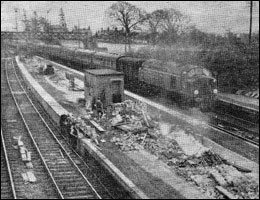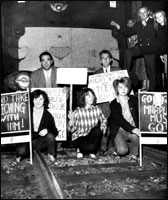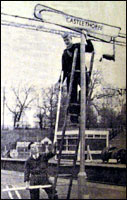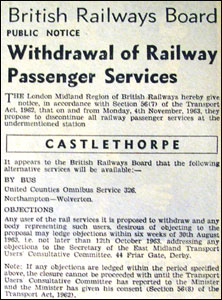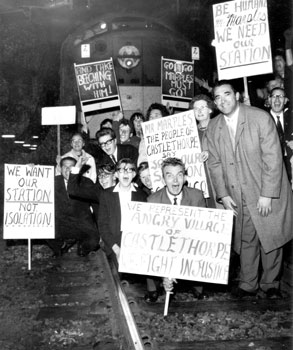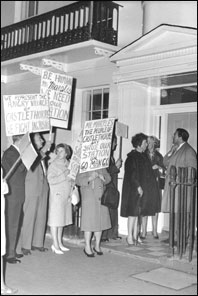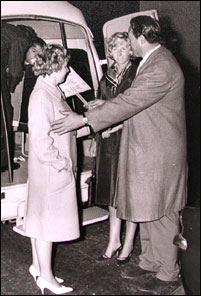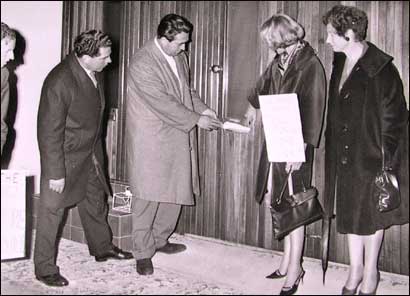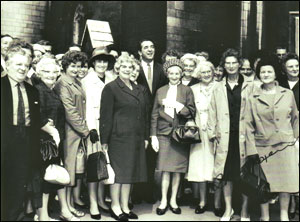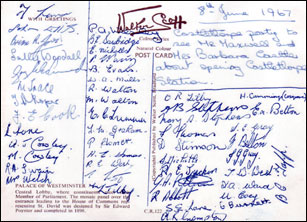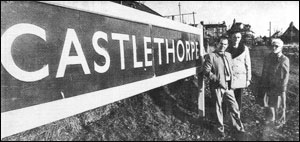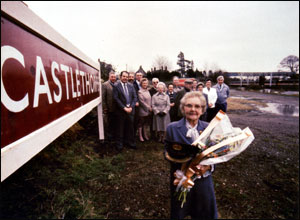|
Castlethorpe Parish Council Minutes
28.5.59
Reported Closure of Railway Station
The Council were very concerned about the reports recently of the possible closing of the passenger station
4.3.1963
Closing of Station rumours
Many strong rumours had reached the Council regarding the proposed closing of the passenger station. It was agreed to act at once by sending a strong protest to The British Transport, also the local transport committee, and to Sir Frank Markham, M.P. for North Bucks. it was estimated that £40,000 had been spent on modernising the station and the work was not yet complete. Stress on this and the services to neighbouring villages as well as Castlethorpe would be made.
23.4.1963
Proposed Station Closure
Knowing they had a special interest in the proposed closing of the railway station, the Council considered that they should be represented on the local Transport Committee. Mrs. St John moved that a letter be sent to the R.D.C., asking to be represented, this was supported by Mr. Homer, who also proposed that Mr. Tapp act as Council representative, should be given permission be given. Mr. Sawbridge seconded this and all agreed.
While on this closing question it was agreed that a letter be sent to the D.W.S. centre at Hanslope Park asking for the Officer in charge, to kindly support the Council’s protest against closure.
20.5.1963
Station Closure
It was agreed that Mr. Stevens and Mr. Sawbridge consult Sir Frank with regard to the proposed station closing, when at their next meeting.
24.6.1963
Proposed Station Closure
Since the previous meeting, members of the Council, namely Mr. Stevens, Mr. Tapp and Mr. Sawbridge had seen Sir Frank Markham and Mr. Maxwell on this important matter. It was learned that a meeting of all local representatives and local government, together with Sir Frank and Mr. Maxwell would be held at Bletchley on July 5th and several of the Council agreed to attend. The Transport Committee had been strengthened with the Users Consultative Committee, and it would be time to move, should and when the closure came up. There existed a strong case for keeping the station open. The chairman stated that the British Legion agreed to a representative on the Users Consultative Committee for looking after disabled men.
29.7.1963
Proposed Station Closing
It was expected that this would be announced, giving the date, very shortly, and in view of this it was agreed to call a public meeting on Sept. 2nd, inviting members of all organisations in the village to attend. The villagers of Cosgrove and Hanslope would also be asked to send representatives. It was agreed that a letter be sent to each organisation stressing the urgency of the meeting. Mr. Homer referring back to the Bletchley meeting considered this a tonic and a unique one. All parties combining for the common good.
9.9.1963
Station Closure
Dead line date for the receiving of protests and hardship cases was Oct. 12th, it was proposed Mr. Homer seconded Mr. Sawbridge that a strong protest go from the Council, this was agreed.
20.1.1964
Station Closure
Previously, several members of the Council had not been informed of the meetings of the working party, in preparation for the hearing with the Transport Users Consultative Committee. It was agreed that Mr. Dunbabin be asked to notify all members of the Council of any future meeting.
23.4.1964
Railway Meetings
Mrs. St John spoke about the railway meetings, and the splendid effort the whole village had made. Mr. Nichols asked if a guarantee had been given with regard to the buses. Mrs Ward assured him that no guarantee had been given.
6.8.1964
Minutes of a Special Meeting held in the Village Hall Aug. 6th 1964, well attended by the public. Mr. Johnson the local bus proprietor was also present and the chairman gave the reasons for his attendance. Mr. Johnson as a local operator, had considered a service to benefit the parish of Castlethorpe, and had a proposal to offer. In his opinion the service offered by United Counties in view of the subsidy being paid to them, was inadequate. Mr. Johnson hoped to service most trains which previously stopped at Castlethorpe at Wolverton. United Counties would no doubt oppose his application, a solicitor would be engaged, and the hearing could be one two or even six months before taking place, but in a special case like this a hearing could be arranged in seven or eight days. The application and proposed service could not be brought before the final decision regarding the Station had been made known, as this would have hampered the efforts being made to keep the Station open. Provision had been made for a service between Wolverton and Northampton, but Mr. Johnson would have to prove that service is need and would be used. At the hearing with the T.U.C.C. the Counties led the meeting to believe that they had not the crews to man the buses, but this was not the case. The traffic manager has since stated that the company had adequate buses and crews to meet the additional services required when railway station closes.
Mr. Johnson was asked a number of questions by those present and a keen discussion followed. It was learned that Mr. W. Beesley had been in touch with Sir Frank Markham regarding the closure. It was finally agreed to contact Mr. Beesley again, asking if he would seek Sir Frank’s support for a deputation to the Minister of Transport.
The chairman thanked Mr. Johnson for attending the meeting, on behalf of the Parish Council and the parishioners present, and declared the meeting closed.
7.8.1964
Following the previous meeting a phone call was made to Sir Frank and he readily agreed to meet the Parish Council the next evening. All members of the Council attended also Mr. Beesley. Sir Frank stated he was shocked to hear the final decision of the Minister was to close the Station, he had thought this would be held over owing to the proposed North Bucks development plan. Mention was made of the £47,000 recently spent on modernising the Station. Mr. Beesley remarked how a member of sources bringing in good income had been gradually withdrawn from the Station.
Sir Frank stated he had asked the Minister for a deputation as early as November ’63, but this had been refused. It was now a question of stewardship and the railways policy in the past. It was now evident that it would cost British Railways more to close the Station than by keeping it open, to the estimated sum of £1,700. Also, it was learned that the Station would be maintained in case future needs demanded its re-opening. The one thing left to do was for the Council to challenge the policy of stewardship through Sir Frank. It was agreed that the clerk send a letter to Sir Frank, strongly demanding a deputation, the latter to be delivered not later, Monday morning 10th August. Details of this and the previous meeting would be given to the local press.
Thanks were expressed to Sir Frank and Mr. Beesley for attending the meeting also to Mrs. St John for her kind hospitality. The meeting was then declared closed.
14.9.1964
Visit to London
Since the previous meeting, and on the eve of the official closing of the passenger station, the chairman and several members of the Council together with a number of parishioners, and led by Mr. Robert Maxwell the prospective Labour candidate, boarded the last train to London, seeking a deputation with the Minister. A collection was made among themselves and the public who were there to see them off. This amounted to £7.15.0, travelling expenses amounted to £3.12.6, thus leaving a balance of £4.2.6.
It was proposed Mr. Tapp, seconded Mr. Stevens that the Council hold this money in the hands of the clerk, for any future needs where a member of the Council incurs expenses when on local government mission, and at the Council’s discretion.
It was also agreed to continue pressing against the Station closing, with letters to all three candidates and top ministers so as to keep it in front of them for when the new Government takes office.
26.10.1964
Letter to M.P.
Mr. Tapp stated there was no doubt we were suffering through being a railway village and he was of the sound opinion that at least 2 councillors should, if possible accompany the M.P. and see the Minister, so as to place all the details and the finer points of the Station closure before him. It was agreed to write to the M.P. asking if this was possible.
22.2.1965
Bus Service
Further discussion followed regarding the bus services, and the Council fully agreed that cases of hardship did exist, and that there was room for additional buses. The 8.20a.m., was overloaded with schoolchildren and public and Mr. Tapp proposed Mr. Paris seconded that the Council go on pressing for a school bus.
Shopping, visiting dentist or hospital, also shift workers, particularly night men found it quite a problem to and from. Report of people going up and down to the Square and boarding the bus before the schoolchildren had also come to the notice of the Council, the clerk being asked to inform the Education Committee of this.
It was also agreed to write to Mr. Maxwell regarding buses and improvement, clarifying the position as to whether the requests had to go through the Newport Committee before reaching the Minister.
19.4.1965
Minutes of Special Meeting between the Parish Council and Traffic managers from the United Bus Company, namely, Mr. Wellman and Mr. Hartley.
On welcoming these two gentlemen, the Chairman explained that in the Council’s opinion the village was very poorly served and since the closing of the railway station, considerable hardship had occurred. Therefore, with the public in mind the Council wished to apply for several additional buses. Mr. Wellman, in reply, first clarified the position with regard to the present bus service, considered adequate at the time of the Station closure. Whatever proposals were put forward for improved services the T.U.C.C. would consider them. Regarding the subsidy, the Government only make up the amount after allowing for fares taken. Concerning a School Bus, Mr. Wellman stated it was left to the decision of the Education Committee whether to uses service bus or contract. After some keen exchange it was agreed that passengers boarding or alighting at Haversham should not be allowed to hinder the travel of the Castlethorpe passengers, as Haversham had a good service, but the company had to also show a reasonable profit wherever possible on the service therefore could not miss the possibility of passengers from the Haversham stop. It was agreed however that the bus returning with schoolchildren in the afternoon would board the children first from the two schools and then pick up any passengers from the recognised stop in Creed Street.
22.4.1965
Annual Parish Assembly
A number of things had been achieved during the twelve months, but in spite of the combined efforts of Council and parish, we had failed to keep the passenger station open. The Council were determined to keep trying, but in the meantime were hoping to get some additional buses. The Council, only a few days before had met the traffic manager and his assistant from the United Counties, and now awaited the results. There was no doubt the closing of the Station was a major blow to the village.
Support for Station Remarking on the meeting recently held between the United Counties and the Council, Mr. Tapp stated that whatever improvements may have been achieved he supported Mr. Dolling in that the fight for the Station should still go on. Mr. Tapp remarked that the meeting with Counties was on the advice of the M.P., and he proposed that the Council still press through the M.P. for the reopening of the Station. Mr. Nichols seconded this and received strong support from the meeting. The deputation on the Sunday evening in an effort to see the Minister had at least made it public and in the Press.
28.6.1965
It was revealed that the transport situation for the village was getting worse, buses were not running and passenger were left stranded at Northampton. The excuse was that the company had not the crews to man the buses. Cases of hardship were numerous, and the Council were determined to keep pressing for the re-opening of the passenger station.
6.12.1965
Rates on Booking Hall
Mr. Sawbridge informed the Council that although the passenger station was not in use, the booking hall was being used still by British Rail, as a parcel depot.
14.2.1966
Railway Station
A considerable time had passed since two of the councillors, along with the M.P. had met the Under Secretary to the Minister of Transport. Evidently no progress had been made with regard to the Station, and with the new city project under consideration it was thought this to be a good lever towards the possible opening of the Station. It was agreed the clerk write to Mr. Maxwell asking him to meet the Council as soon as possible as already there were rumours that some buses were being withdrawn.
14.3.1966
Letter from M.P.
The chairman presented a letter he had received from Mr. Maxwell M.P. thanking him and the Council for the meeting he had attended with regard to the Railway Station. In view of the coming election it appeared that nothing more could be done until afterwards. The clerk was asked to acknowledge the letter. It was agreed that the proposed collection to defray costs of any legal action which might be taken, be left until the Annual Parish Meeting.
5.9.1966
Transport
It was agreed that a strong letter be sent to Mr. Maxwell M.P. stating that the Council were disgusted with the way they had been treated over the transport for the village. The bus service was not so much the Council’s concern now, their main efforts were for the railway station. The clerk was asked to state that the Council strongly favoured another delegation to the present Minister of Transport.
14.11.1966
Railway Station
The chairman informed the Council that he had met Mr. Edmunds and Mr. Woodall and it was thought there was a strong case now for the re-opening of the Station and they expressed the wish of meeting the Council. It was agreed to invite these two to meet the Council following the public lighting meeting.
7.4.1966
Station Meeting
The public meeting, to further the efforts of the Council in their aim to get the Station re-opened, was provisionally arranged for May 5th at 7-45p.m. All local Councils would be invited together with Mr. Dunbabin and Mr. Morgan of the R.D.C.
Proposed Mr. Stevens seconded Mr. Sawbridge that the signatures of those supporting in the village should be obtained before the public meeting if possible. Each councillor agreed to cover a section of the village.
22.4.1968
Passenger Transport Co-ordinating Committee
It was agreed that a reply be sent to Mr. Spinks, of this committee, strongly emphasising the fact that this Council do not accept the bus services as a substitute for the Railway Service, but are willing to give it a trial.
A letter was read from Mr. Edmunds, accusing the Council of giving up their efforts for the re-opening of the Station and of accepting the bus service as adequate means of transport. The clerk was asked to inform Mr. Edmunds that this was not so, but in view of the fact there was nothing new to offer to the ministry, the Council felt they must give the new proposed services a fair trial, confirming also that the Council would still continue their fight for the Station when the time arises.
20.5.1968
Use of Station
It was learned that workmen were making use of the ground floor of the Booking Hall and using it as a mess room.
8.3.1971
Demolition of the Old Station
The clerk had received a letter from Mr. Meakins, construction manager for British Railways. Mr. Meakins was seeking permission for British Railways to form a vehicular access over the Council’s playing field. The access was needed by vehicles demolishing the Old Station, starting on April 18th for 13 weeks.
British Railways had agreed to make good all damage to Council property and offered to give hardcore that the Council would need to level the site as proposed.
Members discussed the matter at length and on the successful proposition of Mr. West, the Clerk was instructed to forward the Council’s permission subject to the following conditions being observed.
a) That for the 13 weeks period required £130.00 be charged as rent. For any further requirement, then £10.00 per week rent to be charged.
b) That 5’ 0” chain link fence be erected along the railway boundary, from the footbridge to the Station House. This section would be removed for the demolition work.
c) That all hardcore deposited be grades and levelled.
d) Make good any damage.
1.4.1971
British Railways
The Clerk had been informed that British Railways were not going to continue with Station demolition. This invalidated the Council’s own plans.
2.4.1971
Station Demolition
Councillor Crompton replying to Mrs. R. Betts assured her that the station demolition was being abandoned for the time being, and that all work to date would be left in a tidy state.
1.8.1971
British Rail Donation
The Council, having received the sum of £20.00 from British Railways in respect of compensation for access rights, resolved to grant £20.00 to the Castlethorpe Play Area Committee’s Funds.
The Wolverton Express 21 August 1959
BRANCH LINES AND VILLAGE STATIONS GET A REPRIEVE
Further reprieves by British Railways in their proposals to close a number of branch lines and stations for passenger traffic were announced by Sir Frank Markham, M.P., at a meeting of the Divisional Conservative Party at Bletchley last Friday. Included in the reprieves are stations at Castlethorpe and Roade, which will remain open for at least another year.
Sir Frank said that the proposals of the B.T.C. would have meant North Bucks would have been denuded of practicality every one of its little railways and been left with just the main line. But very fortunately their had been many protests, including from every parish rural and urban district council, with the possible exception of Wolverton, and these protests had been of the greatest possible help to him in order to fight the case.
Within ten days of his raising the matter on the Adjournment of the House, an announcement was made that the Oxford to Bletchley and Bletchley to Cambridge branch lines would not be closed up, but dieselised and given a further lease of two years.
He then announced that the Verney to Buckingham line would remain open for at least another year, adding that his guess was that the line would remain open for possibly two years.
Stations at Castlethorpe and Roade would remain open for at least another year. “With the continuance of the protest from the local organisations we shall maintain these stations fully open for as long as you have an active parliamentary representative in the area”, Sir Frank added.
Regarding the proposed closure of the Bedford to Northampton line, including Olney station, he said that protests in this connection had not been so strong, but there would be a reprieve for at least six months. The problem here was whether they could get as formidable an opposition to the closures as there had been in North Bucks.
Of the main line proposals, Sir Frank said that there would be electrification, but in between the change-over there would be dieselisation. This latter change would take place next year or early in 1962, with electrification probably in 1964. These points he said were quite new and had not been given to the Press before. He was resolved to do everything he could to retain for the constituency the transport facilities that had been enjoyed in the past and to supplement them by bus services between the villages, but this was “nearly as hard a struggle as the railways”.
Answering a questioner, Sir Frank said that the Transport User’s Consultative Committee had made no decision on the closing of the Buckingham to Banbury line. He went on to criticise this Committee terming them “the stooges of the B.T.C.”, and said that a re-organisation and revision was necessary.
Mr. Walter Beesley, who presided commented on the proposed closure of Castlethorpe station and said that 1,500 people lived in the two villages. It had been discovered he said that takings at the station were 40 per cent up in the last four months of this year.
|
|
|
Castlethorpe Station March 1961
|
|
A diesel-engine express train passing through the "derelict" station at Castlethorpe. Workmen are busy on this part of the main line electrification project. Platforms are being raised and modern waiting rooms built.
|
The Wolverton Express 29 March 1963
Beeching Plan Will Axe The ‘Nobby’
On Wednesday morning details of Dr. Beeching’s plans for steamlining and re-shaping the railways were announced. And as people pored over the many drastic recommendations, modernisation work, now in its second year, was still going ahead at one of the main line stations it is proposing to close – the pleasant village station of Castlethorpe.
Other local plans include the closure to passenger traffic of the Newport “Nobby” branch line, from Wolverton to Newport Pagnell with of course, the shutting down of the intermediate stations of Great Linford and New Bradwell.
The main line station at Roade, from which numbers of workmen travel to Wolverton is also down for closure. Passenger traffic is to be withdrawn on the Bletchley-Buckingham line, and all intermediate stations closed between Bletchley, Bedford, and Cambridge.
Only the closing of Castlethorpe station has come as anything of a local shock in these proposals calling for the shutting of more tan 2,000 stations – one in every three- and taking away of 260 passenger services and some 70,000 jobs.
Pruning drastically the un-remunerative rural services, closing miles of isolated track, running “liner” fright trains, increasing fares. All these were expected in a plan designed to make the railways pay their way.
For those who have seen the transformation at Castlethorpe the proposal to leave it unused, will be hard to swallow. New waiting rooms have taken the place of buildings erected way back in 1882. A new footbridge has been installed. Platforms raised. The offices modernised. And on Wednesday workmen were still busy installing the new lighting system.
Like everything else, the closure is only a proposal. Even if the Government gives the “re-shaping” general approval protests can be made to the Transport Users Consultative Committee.
The redundancy of the Newport Pagnell branch lines had been argued about for years. There can be little hope that passenger traffic can be saved. The big query, however, will be over transporting the many workmen and schoolchildren who travel backwards and forwards to Wolverton five days a week.
The line was ceremoniously opened for traffic on September 2, 1867. Within five years it was carrying nearly 100,000 passengers within twelve-months. There were suggestions for electrification in 1904sic, but things gradually declined and in 1955 the engine shed was taken away from Newport Pagnell, and all engines now come from Bletchley.
Asked for his comments about the proposed closure of the line for passenger traffic Dr. A.A. Clay, Chairman of the Newport Pagnell Urban Council Housing and Development Committee, said it had to really be viewed in conjunction with the whole of Dr. Beeching’s plans.
“I am of the view that if the only way we can get decent wages among the staff and clerical staff in particular, and making us proud of the railways again, is by making these cuts then I am in favour of them,” he told the “Express”. “What I am against is any plan to take away freight traffic.”
The Wolverton Express 29 March 1963
|
|
|
Robert Maxwell & protesters at
Castlethorpe Station
|
VILLAGE FEARS IT MAY BE CUT OFF
Rumours that Castlethorpe railway station may Close, and the present unsatisfactory bus service, prompted Castlethorpe Parish Council to invite Mr. E. Johnson, a director of Messrs. Johnson Brothers coach service, to attend the annual meeting on Monday evening.
The chairman, Mr. A.J. Cowley said that the Council was watching very closely any closure of the railway station, and they had suggested additional buses both to the United Counties and Mr. Johnson. People who wanted to get from the villages to Wolverton just could not do so, and the council felt deeply about it, said the chairman.
Mr. H.F. Dolling, who for the first time in 20 years is not the chairman of the council, pointed out that the United Counties would raise objections to a private operator using their routes, and the Traffic Commissioners would then have to decide. It would however, be a good thing to bring back the private buses he said.
This was a sore point between United Counties and his firm, said Mr. Johnson, but although they held a lot of sway, the United Counties did not hold the road. His firm would have to have a case for private service, and then present this to the Commissioners if it was warranted. Could they find enough people in Castlethorpe to warrant this service on either a Tuesday or Thursday?
It was suggested that rather than just Castlethorpe to Wolverton, there should be a weekly service from Hanslope to Wolverton via Castlethorpe, Cosgrove and Stony Stratford. Mr. Johnson said he was hoping to get support for a Friday service from Hanslope to Newport Pagnell via Castlethorpe, Haversham and Haversham village. He thought there was a better variety of shops in Newport Pagnell, and a number of women present felt that more support would be forthcoming for such a service. There were more attractions at Newport Pagnell, not only the shops, but a swimming pool and other amenities.
Mr. Cowley said they had received a letter from Sir Frank Markham, M.P. who was of the opinion that the station would remain open if only for the workmen’s trains. The R.D.C. had asked the council to oppose the closing, and Mr. Cowley asked for the views of the meeting.
Mr. B. Tapp felt that the railways could dispense with the staff at the stations between Bletchley and Northampton. A four-car diesel set could link up between the two stations, and passengers use slot machines for tickets at the intermediate stops. This would cover about 100 square miles and serve 30,000 people, and it was up to the whole district to fight.
Newport Pagnell R.D.C. knew of plans that only Bletchley and Wolverton stations would remain open in North Bucks, said Mr. Tapp, and he felt they should do something before it was too late. Mr. Dolling, who had conducted a survey, contended that the station at Castlethorpe was running at a 30 per cent profit. Mrs. P. St. John felt that the village may well die if they took no action.
The Wolverton Express 05 April 1963
Modernisation – then closure proposed
CASTLETHORPE RESIDENTS ARE UP IN ARMS OVER THE STATION
The villagers of Castlethorpe are more shocked now at the news of the proposed closure of the railway station, than they would have been four years ago.
During those four years, expensive modernisation, making the station the most attractive in North Bucks, has brought the hope that at last this was to be the first step in the expansion of the village.
The proposed closure has cut short those dreams and brought with it much bitterness at what appears to many to have been a tremendous waste of money. One estimate puts the modernisation cost at £40,000.
Mr. H.T. Dolling, a member of Newport Pagnell R.D.C. told the “Express” that the proposal was a tragedy for the village. From a survey he had made recently the station was working at a 20 cent profit, he said
Only a matter of two-three weeks ago, the traffic committee had written to the works committee at Wolverton. Informing them that two more trains had been put on for workmen, said Mr. Dolling. Even after the proposed closure was announced finishing touches were being put to the extensive modernisation of the station.
Now instead of about 12 oil lamps, the station had 24 new electric lights, raised platforms, new footbridge and concrete steps, new waiting rooms with electric fires, a booking hall – almost twice as large as before, with a new electric cooker.
A petition with 100 per cent backing from the village was sent some years ago when the closure of the station was mooted. This had been acknowledged together with a promise that the station would more or less remain open, said Mr. Dolling.
The station dealt with almost 10,000 passengers a year and if closed could well undermine efforts by the R.D.C. for development, Mr. Dolling Said.
The station has six stopping trains a day bound for London and eight for Northampton, with two in each direction on Sundays.
Mr. Dolling remarked that the village contained a large number of pensioners, who worked for half a century for the railways and who are now in receipt of a free pass and privilege tickets. If the station was closed those well earned privileges would go by the board for the men would be unable to get from the village to use the tickets.
A person who hears a great many of the grumbles, Mrs. J. Trace, of the Carrington Arms, said: “People are not so concerned at the closing of the station. They are up in arms about this terrible waste of money, spending two years modernising the place only to close it down.
At the moment, shoppers could only get into Wolverton on three days each week. Wednesday, Friday and Saturday. Naturally they hoped more bus services would be made available, for anyone wanted to get back to Castlethorpe later than 6 p.m. they had to hire a taxi. Buses ran to Northampton four times a day, she added.
At the Post Office, Mr. Ben Sawbridge, said: “I hope they don’t close the station for it is part of the life of this village. I don’t think we should look too far on the black side, however, because it is in its early stages at the moment.” He felt sure there would be a great deal of opposition to the move, with an official protest from the Parish Council.
Still working on the modernisation are Mr. Norman Brown and Mr. Roger Hall (in our photograph) completing the electrical work. Mr. Brown told us that he had been working at the station on and off for the past 18 months, and reckoned that only about eight people used it between 9 a.m. and 5 p.m.
The Wolverton Express 03 May 1963
Sir Frank asks:
WHY SO FEW
PROTESTS
ON RAIL CUTS?
The Beeching axe fell quite heavily on North Bucks when the list of proposals to streamline the railways was announced. But Sir Frank Markham, M.P., complained at Wolverton on Friday evening that he had received hardly any protests at al about the cuts.
Did this mean, he asked, that the local areas were quite prepared to see railway stations and lines closed down without any protest whatsoever?
He described as “Gilbertian and almost ludicrous” the proposal to close Castlethorpe station to passenger traffic after some £45,000 had been spent on modernising it.
It was also proposed to close Roade station and withdraw passenger traffic from Newport Pagnell to Wolverton, and the Bletchley to Buckingham lines.
“There are many valid reasons for the retention of Castlethorpe station and the Wolverton and Newport Pagnell line,” said Sir Frank. “I do hope that I shall have the full support of the local authorities and individuals in the protests that I shall make during the Committee stages in the House of Commons when we are considering the Beeching Report.”
The Wolverton Express 12 July 1963
Political opponents and councillors combine
FIGHTING THE BEECHING PLAN
The Beeching Plan to close railway lines and stations is to be fought from North Bucks. Leading members of the Conservative and Labour Parties as well as representatives from the majority of local councils are in agreement that the strongest possible protest should be made about proposals to delete services.
Last Friday’s meeting at the Wilton Hall, Bletchley, was an outstanding affair. More than 60 representatives of borough, urban, rural and parish councils were present and there was full co-operation and agreement between members of both political parties.
The proposal to set up a steering committee and smaller working parties to deal with the matter on general and specific levels was proposed by Sir Frank Markham, M.P., and seconded by Mr. Robert Maxwell, the prospective Labour candidate.
After a discussion lasting more than 90 minutes it was agreed that a steering committee should be set up. It will consist of one representative each of the larger councils and those parish councils which apply, Mrs. Elaine Kellett, the prospective Conservative candidate, and Mr. Maxwell-some 18 or 20 members.
Smaller working parties will deal with particular closures of lines or stations as they arise.
Members of any other organisations who might prove valuable in formulating objections will be co-opted. The committee is also prepared to work with other bodies which have already been set up to deal with railway matters.
A working party to deal with proposed closure of the Bletchley to Buckingham line as from September 9 will go into action immediately.
Sir Frank Markham said that the meeting had originated following a suggestion to him from Mr. Maxwell that in view of the railway closures it might not be a bad thing if men of both parties and good will got together and tried to set up a positive case for the retention of lines and stations in the area.
He went on to explain the procedure leading up to the hearing of objections to proposed closures. After obtaining all the information the Transport Users’ Consultative Committee would report to the Minister of Transport and eventually he would give a decision. It was when the Minister was considering the matter that the local M.P. would be able to make his influence felt most, said Sir Frank
Mr. Maxwell said they must ensure that the railways were kept open or that alternative road services were supplied. They must do everything in their power to see that this happened.
“This is why you are here. You are a very large body of elected leaders and it is through you that active and effective protests can be made.
He emphasised that the T.U.C.C. would consider only case of hardship caused by the proposed rail closures and they would have to produce evidence that there would be intolerable hardships to individuals and communities in North Bucks.
When it was pointed out that closures would affect many railwaymen in the area in that they would not be able to travel to and from work without payment, Sir Frank said that it had been laid down that the T.U.C.C. would not be able to consider hardship caused by the cessation of railway staff facilities. This would have to be a question taken up through the normal channels between the employers and the unions.
Among the points made from those present were:
Mr. B. Tapp said that Castlethorpe was a railway village which saw very few buses. There were 113 men from the village and surrounding district who were employed at the Wolverton Works and depended on the rail service to get them there.
Dr. J.M.L. Love said that the Wolverton UDC would back up any protests about rail closures. In view of the fact that there were only seven weeks before the proposed closure of the Bletchley- Buckingham line he called for immediate action.
The Rev. H. Sparling, chairman of Newport Pagnell RDC, drew attention to the fact that people would not be able to take bicycles and push-chairs even if alternative bus services were provided.
Mr. L.H. Fairey, Olney, claimed that the station closures would result in centralised coal depots at the big towns. If there was another bad winter and a shortage of coal it would be the people in the towns who got the coal and not those in the villages.
Mr. R. Dunbabin, Clerk of the Newport Pagnell RDC said he was not at all satisfied with the terms of reference of the T.U.C.C. Not only should such committees consider hardship but also be given the duty to establish facts.
Mr. R. Parsons, Woburn Sands, observed that the railway closures would mean that only people who could afford cars could live in the villages. Everyone else would have to live where they worked.
At the end of the meeting Mr. Maxwell said it had been a “most remarkable” occasion. He thought that for the two major political parties to get together in such a way was a good omen for the future.
Mr. Maxwell paid tribute to Sir Frank Markham for great loyalty he had shown the division and proposed a vote of thanks to him for giving so many years service, Sir Frank was loudly applauded.
Sir Frank said he was a bit bewildered by Mr. Maxwell’s unexpected words. During his political life he had received “more kicks than halfpence”. But what he had just heard was more than a halfpenny it was “a generous half quid”.
The Wolverton Express 23 August 1963
“NOBBY’S” LAST RUN ON NOVEMBER 4?
Castlethorpe station to be closed
This week in our advertisement columns, we carry notices announcing the proposed closure to passenger traffic of the Newport Pagnell-Wolverton branch railway line and Castlethorpe Station. The date is November 4 this year.
Objections have to be lodged by October 12, and if any protests are made the closures will be delayed until the Transport Users’ Consultative Committee has reported on them and the Minister of Transport has given his decision.
Though the warning came some months ago the speed of the proposed closure of the Newport “Nobby” line came as something of a shock. Many people had been confidently forecasting that it would be two years before the last passenger train ran.
The station at Newport Pagnell, Great Linford and Bradwell will close, but goods trains continue to run for the time being.
After years of rumour and denial the probability has become fact. The “Nobby” is on its way out, almost 100 years since the line was ceremoniously opened with bands and holidaymakers on September 2, 1867.
But there is still no official answer to the biggest question of all. Hoe are the workmen and schoolchildren going to travel to and from Wolverton?
A United Counties official told the “Express” this week: “ We have had discussions with the railway officials at Wolverton and I understand provision has been made for the railway workers.”
Wolverton Works comment: “We have not been officially informed of the proposals and we cannot therefore make any comment.”
The British Railway Board, in the advertisement, lists a series of bus services that “appear” to provide alternative transport. The United Counties spokeswoman explained that no new services were being introduced either at Newport Pagnell or Castlethorpe. “Railway traffic consists to a very large extent of railway employees,” he said. “We feel that existing services can cater for other passengers.” Newport Pagnell and New Bradwell were particularly well served, he added.
Asked for his comments, Dr. A.A. Clay, Chairman of the Newport Pagnell Urban District Council, said that as yet no official notification had been received by the Council. “Many enquiries have to be made,” he said. “We are most anxious that adequate facilities are made for the travelling public whether by road or rail. But until such time as we hear officially we cannot do much about it.”
Over at Castlethorpe indignation is high at the apparent waste of money in the recent re-modernisation of the station at a cost of £45,000. We heard on Wednesday that the Newport Pagnell District Council has arranged a public meeting for Thursday next, August 29, in the Parish Hall to consider the formation of a “working party” to find out the wishes of the villagers over the proposed closure.
The Wolverton Express 30 August 1963
Withdrawal Notice
The Wolverton Express 06 September 1963
Castlethorpe is to fight against station closure
Castlethorpe residents do not intend to surrender what many term their “only link with the outside world” – the village railway station – without a fierce struggle.
This was amply demonstrated when more than 100 people packed the Village Hall last Thursday at a meeting arranged by Newport Pagnell Rural District Council to form a committee to challenge the railway Board proposal to close the station on November 4.
Many of the elderly residents could not remember such a meting and Coun. H.T. Dolling told the “Express” that it was easily the best attended meeting held in the village.
A working party of 14 was elected and afterwards, when this met another four people were co-opted.
At the second meeting, Miss Josie Lane volunteered as secretary and Mr. A. Cowley was elected chairman, with Mr. B. Tapp his deputy.
The committee decided to canvass the whole of the area, including Hanslope and Castlethorpe, questions every rail-user in a house-to-house effort, and compile a list of hardships that would be caused by the withdrawal of the passenger trains. The parish of Cosgrove will also be invited to join, and doctors and dentists firms and organisations will be asked of any hardships that could be encountered were the station closed. The United Counties Bus Company is to be asked whether it intends to improve services, and Lord Stonham Chairman of the National Council for Inland Transport will be approached.
After the second meeting, Mr. R. Dunbabin, Clerk of the RDC, said that the approach was being made “because of the utter waste of £50,000 spent at Castlethorpe station if it is just left to rot.”
As soon as objections are lodged and from the tone of the meeting on Thursday it was obvious there would be many, passenger service is retained until the complaints are heard by the Transport User’s Committee. When this body eventually meets, the Castlethorpe residents hope that it will hear objections in the village.
The Rev. H. Sparling, (RDC chairman) explained at the first meeting that they had two lines of attack. The first was the object, but they could only do so over genuine cases of hardship. Then if they failed with their objections, which would be heard by the TUCC, they would have to go to their M.P.
Mr. Dunbabin said they had just two months in which to object, and they wanted to fine out who used the services, the times they travelled, their destinations, and what alternative transport would be available were the station closed.
There were 124 workmen using the station daily from Monday to Friday, 28 children and about 20 others. On Saturdays there were about 20 regulars, and about nine-tenths of the passengers using the station had return tickets he said.
Mr. H.T. Dolling criticised the method of the threatened closure, and claimed that it was rather undemocratic. Instead of getting public opinion first, the Board threatened to close the station and then asked why they should not do so, he said.
The bus service was “absolutely useless” to the general public in the village, said Mr. Dolling, and from his knowledge the bus company could not put more buses on to that service.
He spoke of the loss on privileges to the railway pensioners, of whom the village had a considerable number. These ex-railwaymen had worked for years and after gaining privileges would not be able to use them. Holidaymakers would have to leave trains at Northampton or Wolverton, and there would also the question of visiting people in hospital.
A woman resident told of her husband working in London for 39 years. He now travels daily to the city, but the village would be isolated to him if the proposed closure came about.
Coun. J.H. Baxter (Hanslope) said that the United Counties had repeatedly told them that their buses were engaged and yet they had informed the TUCC that they would be able to cope with the situation in the future. If the company could not cope now he felt they would be unable to do so were the station closed.
Mr. Walter Beesley said that he was not interested in any other form of transport, he wanted the station kept open. He knew that the buses for schoolchildren were at full stretch, and the 24 using the trains would be an impossible burden.
As well as these children, there were also the youngsters who went for further education.
The Wolverton Express 20 September 1963
Castlethorpe’s fight to retain station
Some 209 survey forms were returned from local residents when the Castlethorpe Working Party met on Thursday of last week to discuss proposals to oppose the proposed railway station closure.
At present these forms are being analysed, and should help to find out why the station is needed and how it is being used. With the forms, the members have also received 60 letters of protest about closure, and these will be passed on to the transport Users’ Consultative Committee in addition to the many letters already forwarded by individuals.
From the meeting, it emerged that should the station close Renny Lodge Hospital at Newport Pagnell would be inaccessible by public transport.
Further Education would also be difficult for any ambitious Castlethorpe youngsters, for in mid-week the last bus back to the village leaves Wolverton at 5.45 p.m., and Northampton even earlier at 4.10 p.m. For entertainment, the position is improved at weekends, with buses returning to the village from Northampton at 9.15 p.m. and Wolverton at 10 p.m.
Castlethorpe, it appears is likely to be more isolated in 1964 than at the turn of the century, and even by using what public transport is left, residents will have to be home early-unless they walk, cycle or have their own car or motorcycle. At the
next meeting the survey forms will be discussed in detail, and should provide the base for any case to be put before the T.U.C.C. for the retention of the station.
The Wolverton Express 27 September 1963
100 objections to closing Castlethorpe station
DIRECT APPROCH TO MINISTER
Newport Pagnell R.D.C. decided at their meeting on Wednesday to by-pass the Transport Users’ Consultative Committee and ask the Minister of Transport to intervene and keep Castlethorpe railway station open. It is due for closure on November 4.
The suggestion came from Coun. W. Beesley, who said, that since the formation of a working party in the village, there had been two meetings, with proof of a really strong case.
There were numerous examples of hardship, and he felt sure they had a case to follow a precedent set by the Minister, when in two different parts of the country, he had decided stations would not be closed.
The Chairman, the Rev. H. Sparling, said already over 100 separate objections had been sent to the T.U.C.C.
Support came from Coun. H.F. Dolling, who claimed it would be tragedy for Castlethorpe if the station was closed. The irony, he added, was that trains would still go through the village, and the station be maintained. He spoke also of 40 or 50 ex-railwaymen pensioners in the village, who would lose all their privileges which had been part of their wage structure when they were employed.
The letter from the Wolverton Works manager Mr. G.W Tew, regarding the position of transport for employees was discussed. Coun. R.G. Belchambers said that as private factories at such places as Bletchley were able to send round the villages collecting workers in buses, he found it a little odd that the railways could not stop their own trains for employees.
The last word came from Coun. Dolling who thought there was a sinister motive behind this. He was of the opinion that railway company wanted to lose 1,000 men, and this was one way of doing it.
As well as the direct approach to the Minister a letter will also be go to Sir Frank Markham M.P. for support.
Earlier this week Mr. R. Dunbabin clerk of the R.D.C. told the “Express” that a great deal of information had been available at the second meeting of the Castlethorpe working party on Monday, but still more was being collected.
They decided not to meet again, but to await developments from either the railways or the Minister of Transport. If it is necessary they will however meet at a later date.
Mr. Dunbabin was hoping that the R.D.C. would adopt the steps they did at their Wednesday meeting and added then they had to make the Railway Board realise in no uncertain terms that the station should be kept open. They had clear cases of hardship, he added, and it was abundantly clear that the station should remain.
The Wolverton Express 27 December 1963
RAIL CLOSURES QUESTION IN THE HOUSE
Suspended judgement says Sir Frank
As he promised to the local Steering Committee, Sir Frank Markham M.P., asked questions in the House of Commons last Thursday night about proposed railway closures in North Bucks.
He declared that the present system of investigation had been received with considerable scepticism. Until a better system had been worked out no closures should be made, and there should be a suspension of judgement on the whole future of the railways until the South Eastern review was available.
“If the railways cannot make good in a developing area such as this it is pretty obvious they cannot make good anywhere,” argued Sir Frank.
He was, he said protesting against the proposed closures of four railway lines and several stations. He had the support of nearly every M.P. for Oxfordshire, Bedfordshire, Buckinghamshire and Cambridgeshire, almost every local authority in the affected areas, and the NUR group in the House.
Sir Frank commented on the Minister’s refusal to meet a deputation from North Bucks, one of the fastest developing areas in the whole country. This refusal was a matter of great regret to him, he said.
The Minster had also laid it down that the Transport Users’ Consultative Councils could consider only case of travelling hardship. Any local objectors could only be heard on this one subject. Other protests had to be made in writing to the Minister himself who was already “a prejudiced person.”
If an appeal was made to the Minister they were never allowed to see the replies the British Railways Board made to those points.
“From the moment the Minister receives our letters and our protests we are entirely excluded from any further investigation,” said Sir Frank. “I say this is wrong - it is not justice and it does not even give the appearance of justice.
Railwaymen, besides being indignant at losing their jobs, were also perturbed that good services were being closed down. Yet they had no channel through which they could make constructive proposals for improving the railways.
If the Newport Pagnell – Wolverton branch line was closed, railwaymen at Wolverton Works considered that no one would give “a tuppeny hoot” how they got to work. British Railways had said it was not their job to provide alternative transport.
Yet someone would have to organise ten buses to take railwaymen as well as schoolchildren between the two towns. And here they had the picture of the Minister appealing from himself to himself on future road programmes to re-place the damage done by the removal of those railway services.
In reply Mr. Thomas Galbraith, Joint Parliamentary Secretary, Minister of Transport, said he could not comment on details, nor could the Minister, who was in a quasi-judicial position in these cases receive deputations from any of the parties. That would be improper.
If he received a deputation from one local authority he could hardly refuse to see another. With over 2,000 stations involved it would create a physically impossible task even for anyone as vigorous and hardworking as Mr. Marples.
The Wolverton Express 07 February 1964
Castlethorpe and Roade objectors say -
CHEAPER TO KEEP THE STATION
Villages gloomy places without railways
It will cost the British Railways Board more to close Castlethorpe and Roade stations than to keep them open, claimed objectors at a meeting of the Transport Users’ Consultative Committee at Wolverton on Tuesday.
They pointed to the United Counties demand for an annual subsidy of £8,000 to run workmen’s buses from Castlethorpe and Hanslope. But the village railway station was only making a yearly loss of £1,415. At Roade the Board will lose £900 a year under similar arrangements.
Those objectors – only a few of the 151 were called-painted a gloomy picture of what the villages would be like without railway services. Hardship to workers, shoppers students, hospital patients and visitors. No public transport for getting to evening entertainment or night schools in Northampton and Wolverton.
“It will be a new depressed area if none of us can get to work,” commented Mrs. Pat St. John, representing Castlethorpe Parish Council.
Mr. R. A. J. Astley, senior assistant solicitor for Bucks County Council, condemned the alternative transport arrangements. “The possibility of running those alternative services as a commercially practical contribution to the hardship problem is negligible, “ he declared. “on a pure cash basis the set-up of those services show not a gain but a loss to the public.
“This seems to be an extraordinary suggestion by the Railways Board and explains why the proposition was out forward at such a late stage. Because when one looks at it, it is no solution at all to the problem of the public or your committee.
A £8,000 subsidy to save £1,415 at Castlethorpe was a curious economy, he commented.
The case against Castlethorpe’s closure was put by Mr. R. Dunbabin, Clerk to Newport Pagnell Rural District Council. He stressed the number of 120 objections fro the village and dealt with statistics of population, emphasising that of the 200 families living in the village 93 were employed at Wolverton Works or were retired employees. Ninety such workmen travelled each day with free passes on the train, 20 of them from Hanslope. There were also office workers and schoolchildren using the station.
Mr. J. Baxter, Hanslope, spoke of the long service of some railwaymen, and the inadequacy of the winding roads to cater for large buses.
Individual cases of hardship were mentioned by Mr. E. M. Belton (Wages Department British Railways). Miss S. Robinson (College of Further Education), Miss. S. Lane (apprentice hairdresser, Stony Stratford), and Miss. L. Bates (Inland Revenue Office, Bletchley), who all complained of the inadequacy of the alternative services.
Mr. H. F. Dolling forcibly put the case of the railway pensioners who at the moment enjoyed privilege fares on the railway.
Mrs. St. John stressed the hardship of the general body of the villagers who might find themselves faced with a 4½-hour journey to visit patients in Renny Lodge Hospital, great difficulties in managing evening visits to Wolverton or Northampton for social amenities.
Mr. W. Beesley dealt with the difficulties farmers would encounter.
Summing up Mr. Dunbabin pointed to the proposed growth of the two villages, 40 houses at Castlethorpe and 60 to 70 homes at Hanslope. There were also definite industrial development proposals at Wolverton, and until the whole future development of North Bucks was settled the question of the withdrawal of passenger facilities should be deferred.
Objections to the Roade station closure were put by Mr. R. C. Sawtell, senior assistant solicitor of the Northants County Council. He explained that 90 people used the station every working day. Sixty of those were railwaymen who stood to have to pay 15s a week in bus fares if the station closed.
Replying to all the points Mr. A. Robb. Representing the Railways Board, said in going into the Beeching Plan all stations which had few passengers became suspect. At Castlethorpe and Roade very few people apart from railwaymen and schoolchildren used the eight trains up and eight trains down each day.
In view of the “terrific number” of objections on the grounds of hardship the Board wondered whether their original summer census was right. So a second winter census was carried out, and showed almost exactly similar results.
He agreed that despite the bus services there would be individual cases of hardship. They were sorry, but the Board could not be responsible for individual cases.
The Committee which sat for almost five hours with Professor Robert Peers as chairman, will now make its report to the Minister. This was an adjourned hearing. The first meeting was abandoned after a protest at the last-minute details of alternative services presented by the Railways Board.
A student travels from Castlethorpe to London each week. But if the village railway station closes the Railway Board’s suggested alternative service will mean him having to travel for 6 hours 40 minutes to cover a 50-mile journey.
Objecting to the station closure his mother Mrs. F. C. Woodall, told the TUCC: “It didn’t take that long to do 120 years ago by stage coach, when you had to stop to change horses.”
No free buses for railway employees
The Railway Board has no intention of giving Wolverton Works employees a free bus service if rail stations closure takes place.
Mr. A. Robb of the Line Manager’s Office, Crewe, made this quite clear. Asked questions about possible hardship to men who have for years travelled free to work, he told the Committee: “The financial side we have never considered as hardship. We will not give them free transport by buses.”
He accepted this meant a reduction in wages for the men.
Mr. Arthur Leary, who stressed this point on behalf of the workmen, claimed the loss of privileges was equivalent to a reduction in wages of 2½d. an hour for Newport men, 1½d. an hour for those at Castlethorpe, and 4d. an hour for Roade men.
Mr. R. Dunbabin, Clerk of the Newport Pagnell RDC, said the concessions had been taken into account in negotiating wages since 1915-and were believed to be valued at 5s a week. Now those men were being asked to pay 7s. 6d. a week in bus fares.
This was equivalent to half a year’s rates for some of the older railwaymen in the villages, explained Mr. J. Baxter (Hanslope). And those men taking home a little over £10 a week.
The Wolverton Express 13 March 1964
Castlethorpe Goods depot is to be closed from Monday, April 6, the London Midland Region of British Railways announced this week. Small consignments, full wagon loads requiring collection or delivery, will be dealt with at Northampton as at present.
Full wagon loads not needing cartage will come under Wolverton, or as requested by the consignee. Warehouse traffic will be dealt with by Bletchley, and coal, coke and patent fuel will be dealt with as consigned.
The Wolverton Express 27 March 1964
Hopes to keep Station
If not “kick up a stink”
Uncertainty over the closure of the railway station has caused Castlethorpe Parish Council to shelve the proposal to provide two bus shelters in the village.
At the annual meeting on Monday, chairman Mr. A. J. Cowley explained that it was no use erecting two shelters to gold a dozen people. If the station was closed they would need shelters to take at least 20, and until they knew defiantly, they had shelved the idea.
Commenting on the inquiry by the Transport Users’ Consultative Committee, Mrs. P. St. John claimed a moral victory, adding that it now appeared they had a very good chance of retaining the station. If they did not, she added, then it was up to them to lay down in the road or on the railway line. And “kick up a stink.”
Mr. A. J. Cowley thanked Mr. Dunbabin, Clerk of the Newport Pagnell RDC and his staff, for their help in preparing for the meetings.
He also mentioned the loss sustained by the witnesses at the hearing, adding that probably they could set up a fund to repay the villagers.
The Wolverton Express 24 April 1964
“HARDSHIP” IF TRAINS ARE WITH DRAWN
Identical conclusions have been reached by the East Midland Area Transport Users’ Consultative Committee after hearing objections to the proposed closure of the Wolverton – Newport Pagnell branch railway line and the Castlethorpe and Roade stations.
The withdrawal of these services, the Committee states, would inflict hardship upon various categories of passengers, especially those travelling to and from work.
The Committee has made suggestions for alleviating the hardship in its report which has been sent to the Minister of Transport.
Objections to the proposals by British Railways to close the branch line and the two other stations were heard at Wolverton in January and February last. It was then stated by the United Counties Omnibus Co. Ltd. that the company was prepared to run an alternative service of buses, but it would be necessary for British Railways to guarantee a subsidy of £10,000 per year.
The Wolverton Express 07 August 1964
‘Defer the rail closures’ call to Minister
A Resolution calling the Minister of Transport to defer the closure of Castlethorpe station and other branch lines was adopted at a Labour Party meeting held outside Wolverton Works last Friday.
The resolution called on the Minister to defer the closures until after the general election because of “the great social and economic hardships that will be suffered by railwaymen and their families and many thousands of other North Bucks inhabitants not working directly in the railway industry”.
A further reason for not closing these important local lines, it was stated, was the announced planned huge expansion of population and industry as envisaged in South-East Development Plan.
Mr. Robert Maxwell, the prospective Labour Party candidate, said that the Minister’s orders to close the Newport Pagnell line, Castlethorpe station, and now the Bletchley to Buckingham lane was a devastating blow to many of the local inhabitants. Farmers and traders would also be affected as well as several hundred railway workshop men who would now have to find from their already low wages something like 10s. to 12s. 6d. a week. This, he said, would rightly cause a great deal of resentment and hardship. He went on: “At Castlethorpe the poor skeleton bus service will require a subsidy of £3,000 per annum, whereas to keep the station open would only cost £1,300 per annum. What kind of crazy economic reasons are there for closing this valuable modern station down on which many tens of thousands of pounds of taxpayers’ money had only recently been spent?”
All the trouble taken by the local councillors, trade union officials and others to prevent these closures had all come to nothing and had proved a complete waste of time, Mr. Maxwell added.
The Wolverton Express 14 August 1964
AN 11th HOUR MOVE TO SAVE STATION
BR would benefit, they claim
In an 11th hour attempt to retain the village railway station, the Castlethorpe Parish Council has written to the Minister of Transport, Mr. Ernest Marples, seeking permission for a deputation to meet him.
The villagers contend that British Railways stands to lose more by keeping the station open than by closing it. The annual loss, they point out, is £1,300, yet the bus company wants £3,000 a year subsidy for workmen’s buses alone.
The village hall was packed last Thursday evening at the public meeting called to discuss the Minister’s decision to close the station. A local bus proprietor, Mr. Johnson of Hanslope attended and outlined a service which he intends to operate if permission is granted by the Traffic Commissioners Mr. Johnson explained he did not want prejudice the case for keeping the station.
The Clerk of the Council Mr. R.W. West, told the “Express” that after the meeting he telephoned Sir Frank Markham, who accepted an invitation to a private meeting with the Council the following evening.
On Friday, Sir Frank recommended writing to ask the Minister to meet a deputation, and said he would send a covering note. He would submit all the particulars with the views of the Council and his own. The Council is now awaiting a reply.
Sir Frank, explained Mr. West, said he was astounded at the decision to close the station in view of the North Bucks development and the chance of the village growing. He had asked for a deputation as early as November last, but this had been turned down.
In the letter, Mr. West points out that British Railways stands to lose more by closure of the station than by keeping it open - £1,700 in fact. The station loses £1,300 a year, but the railways will have to pay a subsidy of about £3,000 to the United Counties if the necessary workmen’s buses can be provided.
The letter continues: “British Railways policy in the past has progressively taken income from the station by removing the weighbridge, coal storage for local merchants and refusal of a sugar beet tip. The council contends that the permanent way still has to be maintained, £47,000 had been spent on modernising the station and the workmen were willing to continue a fare to and from work.
“It would be possible for the station to be run from Wolverton with a slot machines used in place of a ticket office and two porters to run the station.” The council adds “Electrification when in operation should simplify the passenger service and two car sets could operate between Northampton and Bletchley thus catering for much of the local needs.”
It is pointed out that passenger receipts have shown a steady increase over the past three years.
Mr. West said the station closure could be delayed if the United Counties could not provide the “adequate” bus service that the Minister has stipulated.
The Wolverton Express 28 August 1964
Private buses to replace trains?
It is quite possible that private bus operators will be running local services under the United Counties licence when the Newport Pagnell branch line and Castlethorpe main line railway stations close. This was announced at Wednesday’s meeting of Newport Pagnell Rural District Council by the Clerk Mr. R. Dunbabin. Private bus owners had applied for licences to run services between Newport Pagnell and Wolverton, and between Castlethorpe, Wolverton and Northampton, he said.
But the applications had now been withdrawn and the operators would run their own vehicles under the United Counties licence.
This was welcomed by the chairman, the Rev. H. Sparling. “It seems to be a good scheme and worthy of trial,” he said.
Coun. F.T. Hawkins declared: “I am not at all happy about the way private interests are ganging-up against the public interest of the nationalised railways. I am not sure this sort of thing will give much help to the people of Castlethorpe.
Coun. R. G. Ballchambers suggested that the Council should write to the Traffic Commissioners objecting to one bus company being allowed to transfer its licence to another firm. He personally thought the withdrawals had come about because the private operators felt they did not stand a ghost of a chance of getting a licence against the United Counties.
Mr. Dunbabin mentioned that United Counties had asked British Railways for a subvention to allow them to run these alternative services. The United Counties had to provide these services as a duty-even if they ran at a loss. Under the new arrangements the small operator had the opportunity of making any profit that was going.
Other Councillors wanted more information. Were the private companies getting anything of the subvention? Could the United Counties take over the services when they found a profit was being made? Was it purely a business arrangement?
It was finally agreed to refer the matter to the RDC Transport Committee for a further report at the next meeting.
The Wolverton Express 11 September 1964
|
|
|
Protesters on the railway tracks
|
AND A PETITION TO MR. MARPLES
Angry villages crowd on to the track in front of the last passenger train to stop at Castlethorpe station on Sunday evening. In the centre is Mr. Robert Maxwell, who led the deputation that caught the train to deliver a protest, petition to Mr. Ernest Marples, Minister of Transport, in London.
The Wolverton Express 11 September 1964
From Castlethorpe to Mr. Marples
PETITION GOES BY LAST TRAIN
No group of people had been more vociferous in its protest at the closure of a railway station than the villages of Castlethorpe. Hundreds of letters have been written, millions of words spoken against the proposal to stop passenger traffic and close this small main-line station that recently under-went £40,000 modernisation.
It was all to no avail. The last train stopped at Platform 4 on Sunday evening. But it did not leave without a fervent last ditch demonstration by over 40 people-and an enthusiastic send-off for a village representation carrying a petition to the Minster of Transport, Mr. Marples.
The angry banner and placard–waving held the already late train up for a further ten minutes as people jumped on the line in front of the diesel engine and sat down on the sleepers.
Things began quietly enough with a meeting under the large chestnut tree on the village green. Late-comers added their names to the more than 500 signatures of a petition condemning the “incredible decision” to close the station. This petition had been speedily taken round Castlethorpe and surrounding villages by Mrs. Eva Cook, Mr. Len Grace, Mr. & Mrs. Norman West, Mrs. P. Mullins and Mrs. Jack Smith.
Mr. Bert Tapp, a member of the parish Council explained to the meeting how everyone had been frustrated and angry at the closure decision after so much hard work had been put in making protests to the Transport Users’ Consultative Committee and other bodies.
When that Thursday evening Mr. Robert Maxwell prospective Labour candidate and his “circus” has visited the village he had been working in the churchyard said Mr. Tapp. Annoyed over the impending closure he had jumped off the wall and asked if Mr. Maxwell could do anything to help.
Mr. Maxwell had suggested the petition and the delegation but emphasised Mr. Tapp there was no question of politics being brought into the protest. In fact all three candidates had been members of a committee leading the fight against such North Bucks closures.
“If more people did what you people have done today to protest against authority that is taking away your right, behaving in an inhuman way, then far less of these closures would be going on in this country,” Mr. Maxwell told the crowd.
He had been immensely impressed with the arguments put forward by the Parish Council and the individuals, he said. The Minister of Transport apparently did not appreciate Castlethorpe’s position without a railway station.
The village had a very poor road network and in a bad winter it was most unlikely if buses would be able to reach Castlethorpe at all.
Mr. Maxwell promised to put those points to Mr. Marples and to continue the fight for the retention of Castlethorpe station and other stations in North Bucks.
“Governments must realise that they have been created to help people and not to hinder them,” he declared.
Other speakers included Mr. H. Homer, chairman of the Parish Council, Mr. Arthur Grigg of the NUR at Bletchley, and Mrs. P. St. John.
They and others were particularly bitter about the station being closed without proper alternative services being put into operation.
Mr. Jack Wallis, prospective Liberal candidate was among the crowd who watched the delegation board the train. Its members were Mr. H. Homer, Mr. A. Cowley, Mr. B. Tapp, Mrs. P. St. John of the Parish Council Mr. J. Sibthorp, Mr. T. West, Miss S. Robinson, Mrs. J. Belton, Mrs. H. Ward, Mr. Maxwell and his secretary/agent, Mr. Bryan Barnard.
|
|
|
Demonstrators outside
Mr. Marples house
in London
|
A demonstration outside Mr. Marples’ house
The train arrived at Euston late, and the deputation climbed into their minibus to get to Eccleston Street as soon as possible.
“The place appeared abandoned,” Mr. Bryan Barnard told the “Express” later. “But a neighbour told us Mr. Maples was in the Mews. We rang the bell and eventually a voice asked us in a typical Marples tone what we anted. He told us “This is the butler speaking.”
Mr. Barnard added that the Police also rang the bell and explained the purpose of the deputation. They were told to put the petition through the letter box. This was done. The deputation also returned Mr. Marples’ letter sent to Sir Frank Markham answering a protest about the closure. With it they put a note deploring the decision and pleading with him to reconsider the matter.
“Mr. Marples knew we were coming,” declared Mr. Barnard.
“The people from Castlethorpe were highly disgusted at the fact he would not meet them. All they were asking was for him to accept this petition. We demonstrated outside the house waving placards and shouting slogans for about an hour until asked to comply with the regulations by the Police. Some of the deputation were so determined and enthusiastic they were quite prepared to stay there all night and catch Mr. Marples in the morning.”The members boarded the minibus again and reached Castlethorpe at 3.30a.m
|
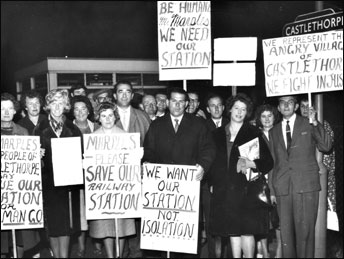
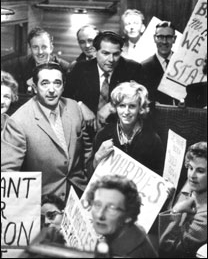 The protesters on the last train.
The protesters on the last train.